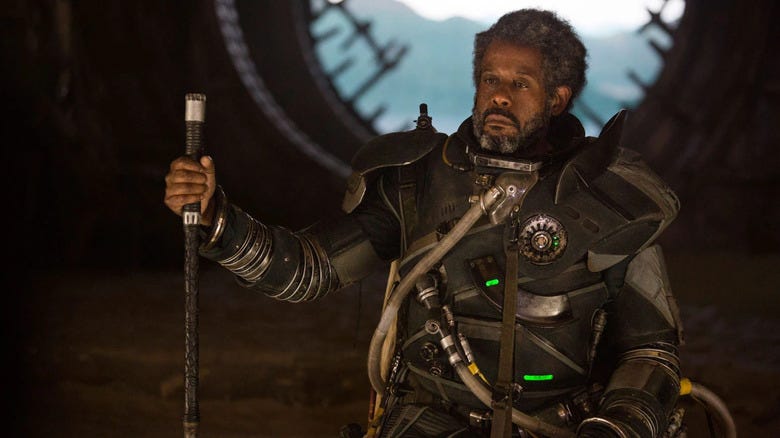If you want to understand how to form a rebellion, you could start a book club, adopt a dog, or throw a Molotov cocktail through the window of your local bureaucracy. Or you could just watch Andor, which finished its second and final season this week. It’s a show. On a screen. And it’s very good.
I wasn’t initially excited about it. Who gets excited about a prequel to a prequel? That’s like getting excited about your uncle’s tax returns. But then the writing was sharp, the acting was electric, and the directing didn’t suck at all. Which is rare. Most things suck. This didn’t.
Now upon its completion, it is sitting up there on Mount Prestige TV with The Wire, Mad Men, The Sopranos, Breaking Bad, and whatever other sacred cows you think are above criticism. In fact, it might be better than all of them. Especially when it comes to women, who in this show are allowed to be people. Imagine that.
And it arrived at the right time. Because we’re all living in a slightly more polite version of the Death Star. There’s no Vader yet, but plenty of middle managers with polished boots and dead eyes. So here’s what Andor taught me (and reminded me) about how to start a rebellion. Spoiler-free, unless you count the spoiler that everything ends and a new hope begins. Which, if you’re reading this, you probably already knew.
1. Different People with Different Ideas, Different Philosophical Perspectives & Skills
The rebellion is not clean. It is not ideologically pure. It is rarely even in agreement with itself.
There is Luthen Rael, the art dealer with an inner fire so white-hot it obliterates both moral certainty and simple delineations of good and bad. He plays a long game so ruthless that Machiavelli might look at him and say, "Wow, dude."
There is Mon Mothma, threading a Ghorman silk needle of politics and social expectation, giving up her daughter’s future in exchange for funds, which is to say she is a mother bartering with the idea of goodness. She represents the rebellion from the inside—the corrosive, slow drip of change within systems designed not to change and to crush the very prospect of it.
Cassian himself is the reluctant participant, the man drafted not by ideology but by reality. He becomes radicalized not by books or rhetoric but by incarceration, cruelty, and proximity to actual human suffering. He is an Everyman, the placeholder for all of us who imagine that neutrality or mere social media opining is an option.
And Bix Caleen, loyal to a fault, tortured into silence. She reminds us that skill matters, but so does resilience, and the two are not always aligned.
Vel and Cinta, walking a tightrope of sacrifice and identity. Fall in love while doing so. Ghost each other. Cinta, especially, is the embodiment of someone who has made the rebellion her religion—she has given herself wholly, completely, dangerously.
Saw Gerrera is the extremist who thinks everybody else is lost. Who believes that his extremism is the only viable response to an empire.
These people do not agree on much. They often do not like each other. Some of them are suspicious of alliances, others are drunk on them. Some want vengeance. Some want justice. Some don’t know what they want, but they know what they don’t want.
That is the point.
It takes different people, with different ideas, philosophies, and skills, to form a rebellion. It takes people who would not, under ordinary circumstances, share much in common. But fighting an empire requires building with those you don't ordinarily align with.
It’s a potluck dinner where everyone brings a different kind of rage. So gather the misfits. The overthinkers. The zealots. The pragmatists. The ones who talk too much and the ones who don’t talk at all. You'll need them.
2. Show Up and Do Your Part
There’s a moment in the prison arc, a kind of low-key epiphany, when Cassian realizes that no one is coming to save them. That their fate is a spreadsheet, a line item. That the Empire does not care enough to even hate them.
And yet: He organizes. Kino speaks. The workers rise. They are liberated.
To form a rebellion, you have to show up. You have to punch in. You steal parts. You smuggle information. You lie to your superiors. You keep secrets. You build alliances that make you a little nauseous. You do your part.
Andor insists that doing your part is the rebellion.
Even if your part is boring. Even if your part is terrifying. Even if your part means you don’t sleep for days or you have to wrestle with some moral tiger. You are not powerless. You are just tired. So rest, and then get back to it.
Because the Empire works precisely because it convinces people that their parts don’t matter. That their war machine is too large. That nothing you do could possibly make a dent.
But Andor shows, relentlessly, that this is a lie. Every dent matters.







